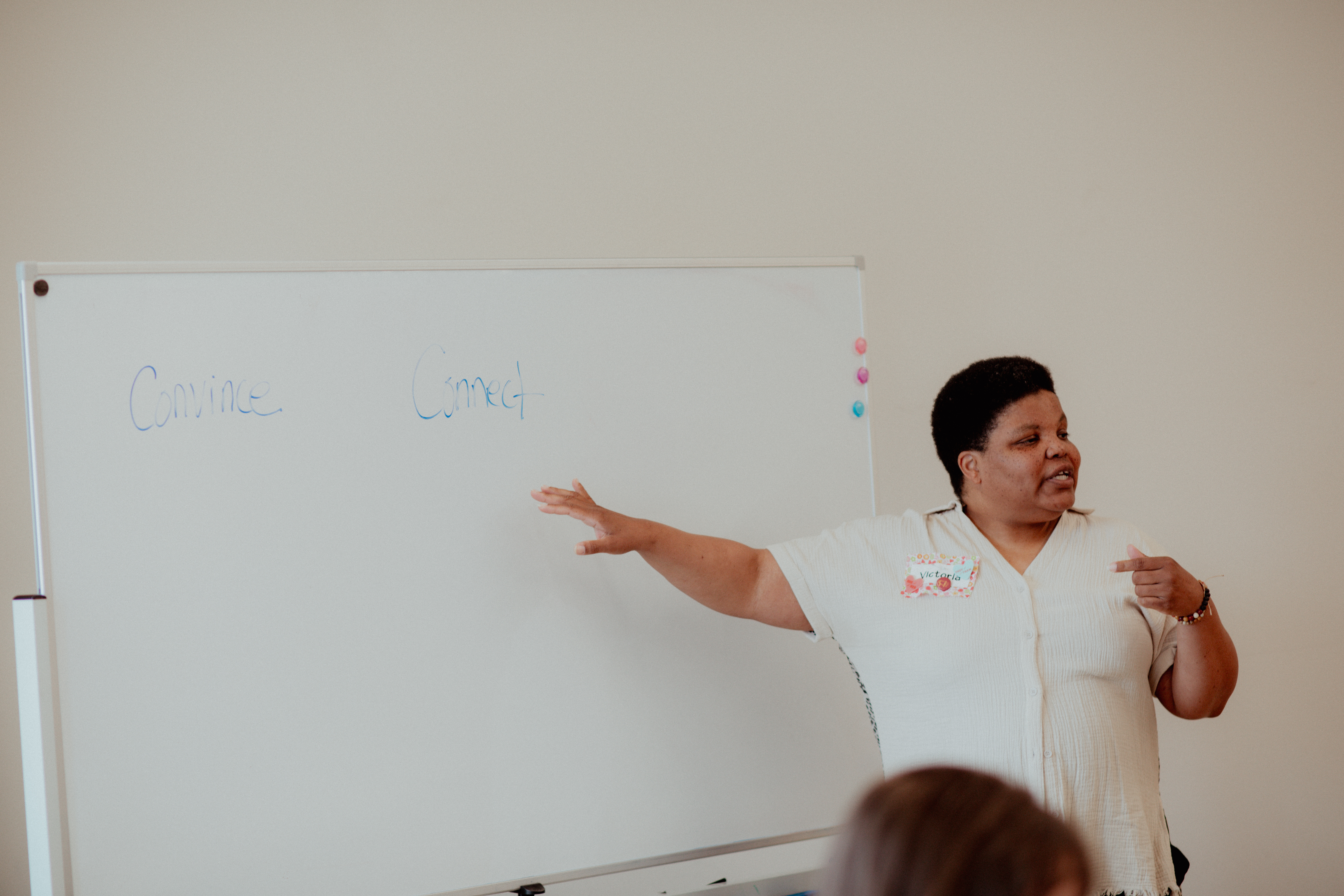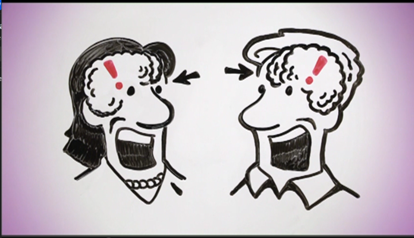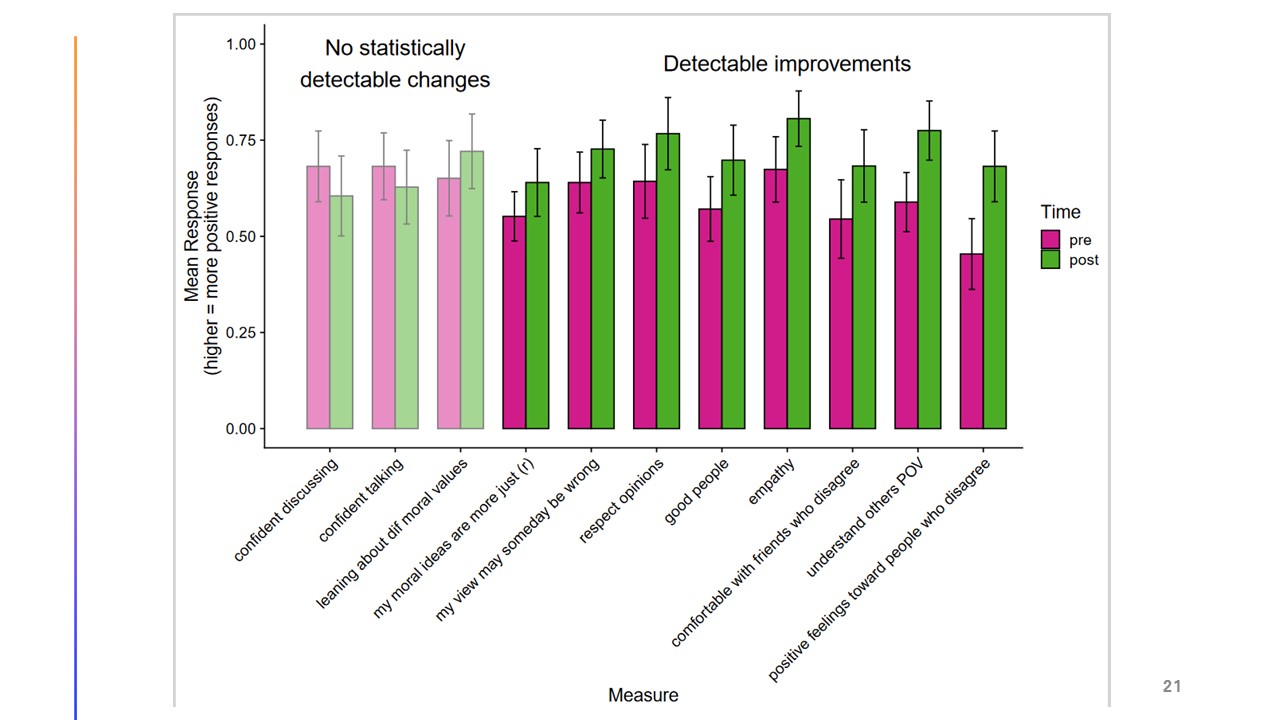Hope in the face of horror // Guidance from Respectful Conversations
This weekend’s attempted assassination on a Presidential candidate is a national reflection about our public rhetoric and political culture. Jesus said “out of the abundance of the heart, the mouth speaks” (Mt 12:34). If what emerges from our mouths and keyboards is an overflow of what is in our heart, then what do we learn from how we and others respond? What do our actions show we value at this inflection point?
How MCC responded to a past inflection point: help and get help
It was after a similarly stunning moment of violence – the January 6 Capitol attack in 2021 – that MCC Respectful Conversations staff began engaging national and international peacebuilders both to share what we had learned from 8 years of building bridges of empathy in Minnesota and see what more there was to learn and do. After years of practicing curiosity in the face of threat, we were able to be curious first. And when we reached out, we were delighted to discover so many partners and compatriots! Early contacts were with the Carter Center, CDC Communications, International Center for Religion and Diplomacy, Resetting the Table, and Princeton University’s Bridging Divides Initiative. We were connected to the Alliance for Peacebuilding, the ListenFirst Coalition, and the Bridging Movements Alignment Council.
These contacts led to some great partnerships: Empathy workshops, where we invited Minnesota faith leaders to learn from outside experts; a film series featuring documentaries focused on people building bridges over differences; Our Director of Strategic Relationships being named an Aspen Institute Better Arguments Ambassador, and a Bridging Movement Alignment Council Faith Ambassador. We won a Strengthening Democracy Field Test Award from the Polarization and Social Change Lab at Stanford and are in an active research study with the University of Michigan’s Belief Systems Laboratory.
Director of Strategic Relationships Jerad Morey presenting on MCC Respectful Conversations as a Better Arguments Ambassador at the Aspen Institute
We have also been glad for more Minnesota relationships: we are partners in Reduce the Rancor, Minnesota – organized by the MN GOP, DFL, and Braver Angels. We are active in quarterly meetings of Minnesota-based bridgebuilders hosted by the MN Office of Collaboration and Dispute Resolution.
So if you’re frightened, or feeling that you do not know enough or have enough to respond to the intensity of our present moment, reach out. We are always happy to help, and we can connect you with others who can if our approach is not the best fit for you.
Respectful Conversations elements can help after this shooting
MCC Respectful Conversations include practices from design to execution that come especially to bear in national moments like the one we are facing. Different facets of the assassination attempt, and our response to it, can highlight them. These include framing the topic, slowing down our response, and knowing the outcomes we want to achieve.
Lead Facilitator Victoria McWane-Creek leads an MCC Respectful Conversations lead facilitator workshop at the Indigenous Association in Fargo, ND (photo credit: Cierra the Gemini)
Cracks in the Whole
Framing a topic is not always as obvious as you would think. “A Respectful Conversation about Democrats and Republicans” names a clear dividing line in the community of "politically attentive Americans." However, given Sunday’s news that the alleged shooter was a registered Republican and was targeting the Republican candidate we can be reminded that there are polarizing, even radicalizing divisions within groups of fellow travelers.
This is a useful thing to remember for anyone who is responsible for or accountable to a community or congregation: to allow some conflicts to go unaddressed or even suppressed can be unhealthy for the community. Valid topics for depolarizing Respectful Conversations extend so much deeper than macro-scale differences in group identity.
Even communities which on the surface may seem unified or to be in consensus may have conflicts which, if not managed, could produce toxic polarization. The good news is that with the right framing, structure and ground rules there is nothing we cannot face.
How do you figure out if a conflict rises to the point of requiring intervention? How do you name the conflict? When framing the topic you are asking what do I need to have a Respectful Conversation about? Useful questions that can get you there include:
- What am I afraid to talk about in this community?
- What was the topic of the last conversation in which I left feeling worse about the other person or myself?
- What topic do I just wish I could talk about with someone who thinks differently from me?
- What is the conversation I wish I could have here, but I keep feeling like there is no way to have it?
Asking these questions in a group may daylight challenges and opportunities that will lead to a stronger and healthier community. There is power in the naming.
A still from the MCC Respectful Conversations' Physiology of Conflict training video
Slow your roll
Human beings have fight/flight/freeze responses to danger embedded deep within our physiology. We evolved them out of necessity to help us survive actual physical danger. Our adrenaline picks up, our hearts beat faster, our muscles tense. Our brain routes control away from the prefrontal cortex – where self-control and conscious processes are located – to the limbic system where we are more emotion- and instinct-driven.
This system also activates when we perceive not just immediate danger to our person, but threats to our worldview; To the assumptions on which we build our identity and beliefs; To assertions that challenge our understanding of reality and our criteria for decision-making. We can respond to ideas outside our worldview in the same way we respond to physical threats. You very likely have had a conversation with a person, read an article, or viewed an online commentary and felt your own emotions get activated. Perhaps you responded to that exposure from a sense of danger and threat?
Certainly many people on social media, who were not at the campaign event this weekend where the shooting took place and were not themselves in any physical danger, still operated from a space of threat. There were immediate accusations, declarations about who needed to be fought in order to reduce the feeling of threat, despairing calls to flight, and intentional attempts to ignore or distort the facts to fit into a predetermined worldview. “Liars and Trolls overwhelm social media” read one Washington Post headline.
Speaking or reacting from a threatened space when one is not in physical danger can lead to more toxic polarization.
Respectful Conversations are designed to slow that whole physiological threat response down and re-engage our prefrontal cortex. With time for silence; circles for questions; and facilitated conversation we shift ourselves out of the immediate-response limbic system and into the part of our brain that helps to be curious and build, rather than destroy, bridges between us and fellow humans.
You can practice this yourself by taking deep breaths when you notice your body responding to news about this event; by giving yourself a minute of silence or time away from whatever is causing the feeling; and by being curious about whether what you are being exposed to is true and credible.
Know your goal
What do you want yourself and your nation to experience after this weekend’s shooting? What would give you hope? How are you called to act? If you don’t know, then take some deep breaths to reflect.
Each action we take can have an outcome, and it helps if you know what you want that outcome to be in advance. If you don’t have a goal, or if you realize your short-term goals is to verbally “strike out” or “defend myself” then your actions might increase polarization in yourself and others. Avoid this by stating to yourself what you want to accomplish.
For a dozen years with thousands of people we have evaluated Respectful Conversations enough to state confidently that they increase empathy over the topic at hand. Respectful Conversations are designed not to change minds, but soften hearts. They reduce feelings of animosity towards those with other perspectives. They strengthen relationships in communities. More recently thanks to our research partnerships we can state that they reduce “affective polarization” and increase “bridging quotient,” meaning that conflicts are cooled down and individuals leave better equipped – and more likely to act – as peacemakers in the world.
These may not be your goals, either as an individual or as a leader. Other bridging experiences focus on collaborative projects, fighting corruption, forming multipartisan policy, arguing better, and civic engagement.
So give us a call if you want to host a Respectful Conversation - or if you're just looking to be pointed in the direction of someone else doing something good in a time of distress. Find links to MCC opportunities and partners below.
Coming Up
MCC Respectful Conversations are being scheduled for August and into October and even past the election. They will be all over our state – Cloquet, Saint Cloud, the Twin Cities and possibly more places. Find a public-facing MCC Respectful Conversation that you could sign up for here. More will be added as details are finalized.
Learn about hosting an MCC Respectful Conversation in your community here.
If because of time, logistics, desired outcomes or any other reason an MCC Respectful Conversation is not right for you, you can also look at online trainings and in-person opportunities offered through partners of the Reduce the Rancor, Minnesota campaign.
You can also find online opportunities for bridging experience and democracy-strengthening through the national clearinghouse of the Bridge Alliance, CitizenConnect.us.
There are hundreds of thousands of people across our country, people who plan to vote all sorts of different ways, whose most fervent goal is peace. Who desire a vital debate and vigorous democracy. Who want to be understood, and who want to understand. People who have been training to be a part of the solution to what is ailing our political climate. If you are ready for a more hopeful future then you are far from alone. Minnesota Council of Churches - and the Bridging movement as a whole - are ready to help you in the next step.






